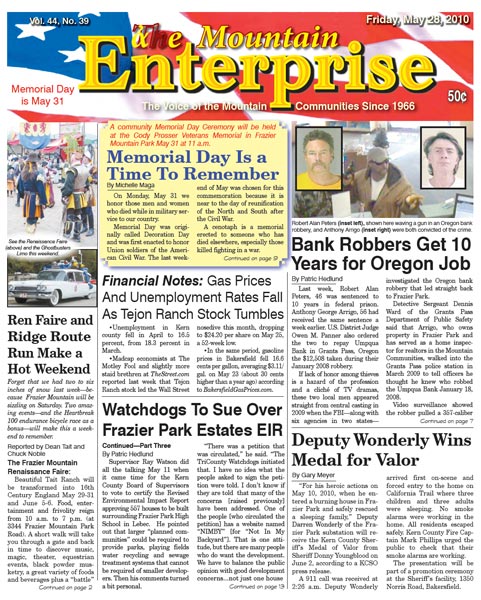
Howard Meythaler
By Patric Hedlund
Howard Meythaler’s Long Journey Isn’t Over Yet
To some he is a gentle giant. To others Howard Meythaler is likely considered a plague—deaf as a doorpost, persistent as a tax collector… and smart—a dangerous combination of qualities.
No one disputes that the retired pharmacist notices things others tend to miss. Perhaps that is one of the gifts of his late-in-life deafness: Howard Meythaler maintains focus and he won’t budge until he gets answers, even when it takes slow, steady and persistent questioning for over eight months.
That is how long we have been watching him trying to find out why 124 votes cast by his Pine Mountain neighbors weren’t counted in the June 2009 election. “These are your neighbors’ votes, treat them with respect,” could be his motto.
Votes Thrown Out
It now appears that over 13.6 percent of the votes cast by members in June 2009 were thrown out by Danielle Jones, president of a firm called HOA Elections of Murrieta, CA. Jones was hired by PMC as the Inspector of Elections for 2009.
Why It Matters
One member of today’s board was elected by only 10 votes. The reported vote count for that three-year term was Mary Hansen 270, Carole Trudeau 260, Roland Reuter 258, Jack Throckmorton 249. If those 124 votes had been counted, the occupant of that board seat may possibly have been different.
Erroneous?
On March 9, Board Secretary Scott Robinson wrote Meythaler “The information presented to you by Ms. Jones and the numbers and reasons for disqualifications are correct and final.”
Robinson accuses The Mountain Enterprise of providing “erroneous information,” saying, “We are afraid we cannot identify where the author of the article obtained her erroneous information.”
Robinson did not really need to look very far to find the source of the erroneous information: it came from the association and PMC management.
In June and July the PMCPOA manager said there were 107 disqualified votes. In fact, the July 2009 issue of The Condor (the PMCPOA’s newsletter) reports on page 10 that 786 “valid” votes were counted and 107 votes were disqualified [emphasis added].
But in an email to Meythaler dated December 8, 2009, Danielle Jones stated: There were 123 ballots invalidated [emphasis added]. Then, at the March 20, 2010 PMCPOA Board meeting, Robinson told members and the board that the number disqualified was 124 votes [emphasis added].
Robinson does not explain why the association and HOA have broadcast contradictory information, or why the association doesn’t seem to be sure even today how many of its members’ votes have been thrown out.
The number of disqualified votes published by the association in June and July 2009 has now grown by 17 votes, more than the vote spread between three of the candidates for that three-year term on the board.
Go Away
Even today, as the number of discarded votes is still uncertain, the single consistent thread has been an effort by the board, the administration and HOA Elections to get Meythaler to stop asking questions and just go away. But he says he is driven by the concern that people who did not use the double envelope system should have a right to have their votes counted.
For five months HOA’s Jones avoided providing clear answers to both Meythaler and this newspaper about why the votes were disqualified. For six months telephone calls have not been answered and emails have been ignored on the subject by HOA Elections, PMCPOA’s former general manager and the executive assistant.
Double Envelope Problems
In the December 8 email, HOA’s Jones finally outlined her reasons for disqualifying ballots: “113 due to improper use of the double envelope procedure; 2 due to homeowners identifying themselves on the ballot; 2 due to multiple ballots in the envelope; and 6 ballots due to the number of votes could not be determined on the ballot.”
The double envelope procedure places the Tract/Lot number on the outside envelope which is logged, then destroyed, before opening the inner envelope to retrieve the ballot. This is to maintain privacy.
Expectation of Privacy
A website maintained by Adrian Adams, PMC’s former attorney is called www.Davis-Stirling.com. Adams implies on his site that Lawrence Stirling, co-author of “The Davis-Stirling Common Interest Development Act,” is his firm’s legal associate. That section of the California Civil Code governs condominium, cooperative and planned unit development, including property owners associations. On that site, this exchange occurs:
Question: If owners sign their ballots, does it invalidate them?
Answer: No, signing ballots does not cost owners their votes. Restrictions on signing are imposed on associations, not owners. As such, associations can not require that members sign their ballots. Civil Code §1363.03(e). Hence, inspectors of election should not invalidate an owner’s votes just because they inadvertently signed their ballot.
At the March 20 board meeting, Scott Robinson said Adams had “flip-flopped” and backed away from that position, removing it from his website. But we confirmed it was there on March 22.
Meythaler believes that people who do not use the double envelope system to maintain their own anonymity should not lose their rights, their voice and their votes. “Ballots without inner envelopes should also be counted as though they were signed by the member; because there was no expectation of privacy,” he argues.
What Are the Real Numbers?
So, on March 22, this reporter, as a PMC member, wrote the board: “In accord with civil code 1365.2, case law indicates that members have a right to inspect ballots as long as member privacy is preserved.” We asked for a date to come inspect the ballots.
On March 25 we received an email letter from Leonard Siegel, the PMC board’s current attorney, denying that request: “As you perhaps know, the time for challenging the election has now passed [emphasis added]. See California Corporations Code Section 7527. While the Civil Code allows for inspection of ballots upon a request to the inspector, where the time has passed to contest an election and the right of possession of the ballots has passed to the association, the unconditional right of a member to inspect the ballots no longer exists.”
Was the prolonged stalling and failure to reply to inquiries by the association’s inspector of elections designed to deny the rights of members to inspect the ballots to confirm the real outcome of the election?
Meythaler’s invitation
Meythaler wrote this to the board on March 22: “I am a long time supporter of secret ballots; and never envisioned that they could actually cause members to lose their vote.
Therefore, my mind will not be at rest, and I will continue on to ask Lawrence Stirling [co-author of the Davis-Stirling code] to help members keep their right to vote, and [to] have said vote count, by making necessary changes to the [state] code. An invitation is extended to the Board of Directors to join me in preserving members’ rights.”
In the meantime
Lee Krimm from the governing documents committee stood to agree that the board needs to give guidelines about when not to disqualify votes to the next inspector of elections for 2010. The PMCPOA Board voted not to rehire HOA Election’s Jones.
The Future of the POA
The vote for the renewal of the CC&Rs is already underway. The future of the association depends on enough members trusting that their vote counts, and then voting. To achieve the required quorum, 1,600 votes must be cast for the association to continue.
Director Frankie Sanchez said that “people need to believe their vote will be counted or they won’t participate in elections and we have a low enough turn out as it is….”
As we were preparing to go to press this week, an update on this subject was received.
Dear Editor:
I just received my weekly newsletter from [property owners association attorney] Adrian Adams. On page 2 he has a piece regarding unsigned outer ballot envelopes. Note that Danielle Jones of HOA Elections is referenced as having a “possible solution.”
Excerpt from Adams’ Newsletter: Unsigned Ballot Envelopes
Question: What happens if owners forget to sign the outer envelope? Do they lose their vote? Can we return the envelope to the owner for signature?
Answer: Normally, the owner loses his/her vote. For an envelope to be valid, voters must sign their names in the upper left hand corner of the outer envelope. [Civil Code 1363.03(e)(1)]
This allows the Inspector to verify a voter’s eligibility. If the envelope is unsigned, that opens the door to voter fraud, i.e., anyone could have submitted the ballot. Accordingly, when an envelope is unsigned, the Inspector sets it aside unopened and uncounted.
Irrevocable. Once a ballot is received by the inspector of elections, it is irrevocable. [Civil Code 1363.03(f)].
As a result, returning an unsigned envelope is not a good option because it can be changed or revoked. This creates a problem for associations because quorum requirements are so difficult to meet, they usually need every vote. In addition, people don’t like the idea of losing their vote because they forgot to sign the envelope.
Unfortunately, this creates administrative costs for the association, and may be inconvenient or impossible for owners (especially those who are out of town).
A solution implemented by Inspector Danielle Jones, owner of HOA Elections, involved the use of an affidavit (a signed declaration under oath).
The declaration attests to the authenticity of the ballot. This is then attached by the Inspector to the envelope. The envelope is thus “signed” without changing or revoking the ballot.
Since signed declarations can be done by mail, fax and email (with a pdf attachment of the signed declaration), they are more convenient for owners.
Logistics. Inspectors of election are not required by statute to enact any solutions to unsigned envelopes. Depending on the association, the time and cost of contacting forgetful owners may not be justified. For those associations who want a solution to the problem, boards should talk to their inspector of elections to find out if the inspector can follow up with owners and what the costs would be.
Meythaler’s letter continues:
All the while Jones was obstructing, delaying and avoiding answering my immediate questions— and also your questions after you noted I was not getting answers—she was allegedly hiding the solution she had devised and used in other occasions in which she was the inspector of elections! Why did she never state this solution even after the nine-month challenge period for ballot counting?
Really allegedly smells like a setup to keep from any possible change of elected person; as there was only 10, 12 and 21 votes difference from the three other candidates and the votes of the the elected director.
The PMCPOA Board of Directors should demand an answer from her as to why she never proposed her solution! They paid her to fully perform.
Howard Meythaler
Pine Mountain
And so it appears that through Howard Meythaler’s continued vigilance, his quest has at last identified a possible alternative in the future to boards allowing their neighbors’ votes to be simply thrown wholesale into the “discard” bin.
This is part of the May 28, 2010 online edition of The Mountain Enterprise.
Have an opinion on this matter? We'd like to hear from you.


